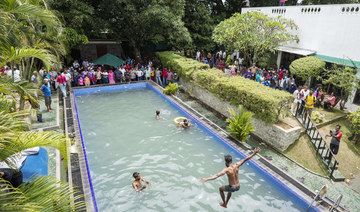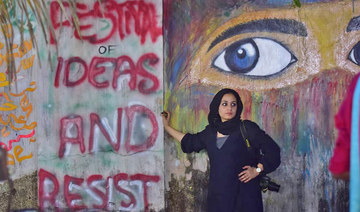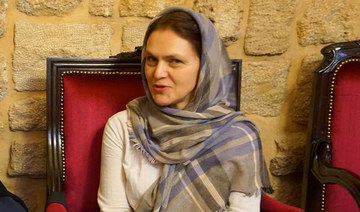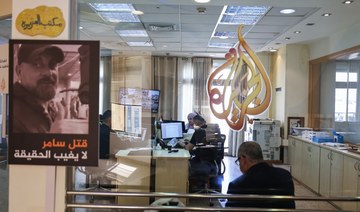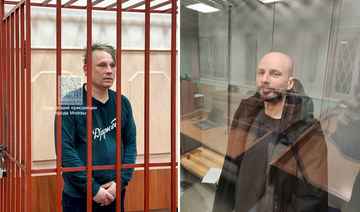ANKARA: Good and responsible journalism has become a highly depated issue in Turkey. When it comes to fake news, a significant number of Turkish people say they have already encountered it.
This year’s Reuters Digital News Report ranked Turkey first out of 37 countries in terms of exposure to fake news. Almost half of Turkish respondents — 49 percent — said they had read made-up stories in the week before the survey was conducted.
Turkey was followed by Malaysia, Greece, Mexico, Hungary, Romania and the Czech Republic, which scored 44, 44, 43, 42, 38 and 36 percent, respectively.
Exposure to fake news in the US stands at 31 percent, while the figure is lower in the UK at 15 percent, and in Western European countries such as Germany at 9 percent.
There are myriad examples of fake news in Turkey. In June, a video clip on social media in which a young person brutally cut a puppy’s feet was swiftly branded as a “Syrian refugee torturing an animal.” After being broadcast on many news sites and on social media, it triggered hate speech and xenophobia among many in Turkey.
The video was widely shared, reaching thousands of people. But it turned out that the video had been fabricated — and actually originated in Jordan, not Turkey.
According to the Reuters survey, many Turkish people believe fake stories are made up for political or commercial reasons.
The proportion who agree that the government should act more to separate fact from fiction on the Internet stands at 68 percent in Turkey, compared with 41 percent in the US and 59 percent in Germany.
To check the accuracy of the news, people often refer to Dogruluk Payi (Share of Accuracy) and Teyit.org, two Turkish nonprofit fact-checking organizations that were founded in 2014 and 2016, respectively. Their teams have examined hundreds of suspicious stories and photographs online.
Isinsu Acar, a university student in Istanbul, came across fake news this week when commuting, and said the documentary contained several unfounded arguments.
“To confirm that it was false, I used my logic and looked for inconsistencies,” she told Arab News. “Usually this step is enough to confirm. If it is not, I try to use reliable news sources. I use Dogruluk Payi to test whether news is true or not. I refer to the alternative media frequently.”
The rise of social media as a source of news in Turkey, where about 90 percent of the media is owned by pro-government business groups, also contributes to fake news consumption and can trigger social tensions and inflammatory rhetoric, experts have said.
News literacy in an area where technology facilitates the spreading of made-up stories is important in rising above fake news.
Servet Yanatma, an independent researcher and journalist who has contributed to the Reuters Institute’s Digital News Report, said all these figures revealed not only distrust in media content but also a high level of polarization.
“The respondents seem to be divided into two camps, either trusting or distrusting news media. People in either camp prefer to trust what they want to believe without questioning the accuracy of the news,” he told Arab News.
According to Yanatma, in Turkey — where media literacy is low — modern laws that address the challenges of online media, respect copyright and keep personal rights are necessary, along with some ways of solving the issue of deep polarization.
When Turkish participants in the Reuters survey were asked their main source of news in the past week, TV came first with 48 percent, followed by online, including social media, with 39 percent. The shares of radio (7 percent) and print media (6 percent) remain low.
“When the coverage of television and newspapers is largely controlled, their online content is controlled as well. The main question for me is how much the people access and use the ‘fake news.’ If a large part of traditional and online media is controlled in a country, people will inevitably expose its partisan coverage,” Yanatma said.
Why Turkey ranks first in the world in exposure to fake news
Why Turkey ranks first in the world in exposure to fake news
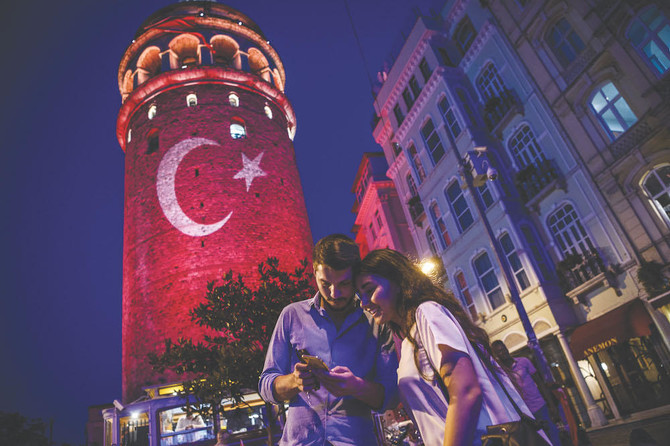
Iran sentences man to death for posts during 2022 protests
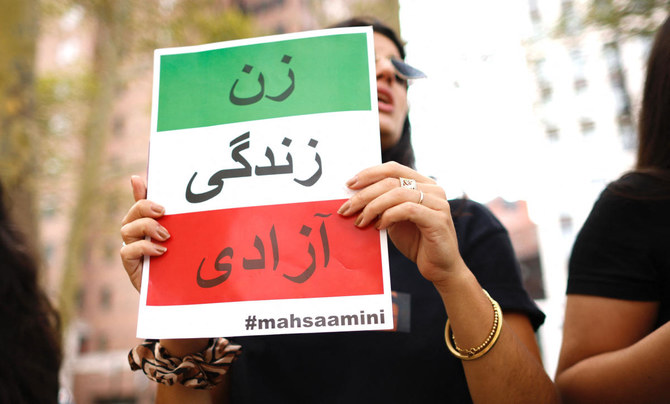
- Mahmoud Mehrabi was convicted of inciting killings, insulting religious sanctities
TEHRAN: An Iranian court has sentenced a man to death over content he posted online during 2022 protests over the death in custody of an Iranian-Kurdish woman, the judiciary said Tuesday.
Iran was gripped by months-long protests over the death of Mahsa Amini, 22, after she was arrested for an alleged breach of the strict dress code for women.
The judiciary’s Mizan Online website said Mahmoud Mehrabi was found guilty of posting content that included guidance on how “to use homemade weapons and called for the destruction of public property.”
He was convicted of “inciting people to commit killings and insulting religious sanctities,” it added.
Lawyer Babak Farsani said Mehrabi was found guilty of the capital offense of “corruption on earth.” He can appeal against the sentence before the Supreme Court.
The months-long protests sparked by Amini’s death saw hundreds of people killed in street clashes, including dozens of security personnel.
Thousands were arrested as authorities moved to quell what they branded foreign-instigated “riots.”
Last month, an Iranian court sentenced popular rapper Toomaj Salehi to death for supporting the demonstrations.
Nine men have been executed in protest-related cases involving killings and other violence against security forces.
Amnesty International says Iran executed 853 people in 2023, the highest total since 2015.
Pulitzer Prizes in journalism awarded to The New York Times, The Washington Post, AP and others

- The Pulitzers honored the best in journalism from 2023 in 15 categories, as well as eight arts categories focused on books, music and theater
NEW YORK: The New York Times and The Washington Post were awarded three Pulitzer Prizes apiece on Monday for work in 2023 that dealt with everything from the war in Gaza to gun violence, and The Associated Press won in the feature photography category for coverage of global migration to the US.
Hamas’ Oct. 7 attack on Israel and its aftermath produced work that resulted in two Pulitzers and a special citation. The Times won for text coverage that the Pulitzer board described as “wide-ranging and revelatory,” while the Reuters news service won for its photography. The citation went to journalists and other writers covering the war in Gaza.

The prestigious public service award went to ProPublica for reporting that “pierced the thick wall of secrecy” around the US Supreme Court to show how billionaires gave expensive gifts to justices and paid for luxury travel. Reporters Joshua Kaplan, Justin Elliott, Brett Murphy, Alex Mierjeski and Kirsten Berg were honored for their work.
The Pulitzers honored the best in journalism from 2023 in 15 categories, as well as eight arts categories focused on books, music and theater. The public service winner receives a gold medal. All other winners receive $15,000.

The 15 photos in AP’s winning entry were taken across Latin America and along the US-Mexico border in Texas and California in a year when immigration was one of the world’s biggest stories. They were shot by AP staffers Greg Bull, Eric Gay, Fernando Llano, Marco Ugarte and Eduardo Verdugo, and longtime AP freelancers Christian Chavez, Felix Marquez and Ivan Valencia.
“These raw and emotional images came about through day-to-day coverage of a historic moment in multiple countries documenting migrants at every step of their treacherous journeys,” said Julie Pace, the AP’s senior vice president and executive editor.
The United States has seen more than 10 million border arrivals in the last five years, with migrants arriving from a wide range of new locations like Venezuela, Cuba, Ecuador, Haiti and Africa, in contrast with earlier eras.

The AP has won 59 Pulitzer Prizes, including 36 for photography. The news cooperative was named a finalist for the national reporting Pulitzer on Monday for its coverage of hundreds of thousands of children who disappeared from public schools during the pandemic.
In citing the Times for its work in Israel and Gaza, the Pulitzer board mentioned its coverage of the country’s intelligence failures, along with the attack and Israel’s military response.
The award comes even as The Times has faced some controversy about its coverage; last month a group of journalism professors called on the publication to address questions about an investigation into gender-based violence during the Hamas attack on Israel.
The Times’ Hannah Dreier won a Pulitzer in investigative reporting for her stories on migrant child labor across the United States. Contributing writer Katie Engelhart won the newspaper’s third Pulitzer, in feature writing, for her portrait of a family struggling with a matriarch’s dementia.
“Every one of the winners and finalists showcases a drive for original, revelatory reporting that underpins so much of what we produce, from the biggest storylines in the news to feature writing as well as classic investigations,” said Joe Kahn, the Times’ executive editor.
The Washington Post staff won in national reporting for its “sobering examination” of the AR-15 semi-automatic rifle, which came with some gut-wrenching photos. “We were eager to find a way to cover it differently and change the conversation about mass shootings,” Peter Walstein, the Post’s senior national enterprise editor, said in the newspaper.
The Post’s David E. Hoffman won in editorial writing for a “compelling and well-researched” series on how authoritarian regimes repress dissent in the digital age. Its third award went to contributor Vladimir Kara-Murza, for commentaries written from a Russian prison cell.
The New Yorker magazine won two Pulitzers. Sarah Stillman won in explanatory reporting for her report on the legal system’s reliance on felony murder charges. Contributor Medar de la Cruz won in illustrated reporting and commentary for his story humanizing inmates in the Rikers Island jail in New York City.
The staff of Lookout Santa Cruz in California won in the breaking news category for what the prize board called “nimble community-minded coverage” of flooding and mudslides. On its website Monday, Lookout Santa Cruz said that it made its coverage free at a time of crisis in the community, and also used text messages to reach people without power.
“In short, we did our jobs,” the staff said in an unsigned article, “and we heard so many thanks for it. The Pulitzer is icing on that cake.”
The Pulitzers gave a second award in national reporting to the Reuters staff for an “eye-opening” series that probed Elon Musk’s automobile and aerospace businesses.
In local reporting, Sarah Conway of City Bureau and Trina Reynolds-Tyler of the Invisible Institute won for an investigative series on missing Black girls and women in Chicago, which showed how racism and the police contributed to the problem.
The Pulitzer in criticism went to Justin Chang of The Los Angeles Times for evocative and genre-spanning coverage of movies. The Pulitzer board’s second special citation went to the late hip-hop critic Greg Tate.
The awards are administered by Columbia University in New York, which itself has been in the news for student demonstrations against the war in Gaza. The Pulitzer board met away from Columbia this past weekend to deliberate on its winners.
The Pulitzers announced that five of the 45 finalists this year used artificial intelligence in research and reporting of their submissions. It was the first time the board required applicants for the award to disclose use of AI.
The prizes were established in the will of newspaper publisher Joseph Pulitzer and first awarded in 1917.
Advocacy group ‘alarmed’ as journalists shot at in West Bank
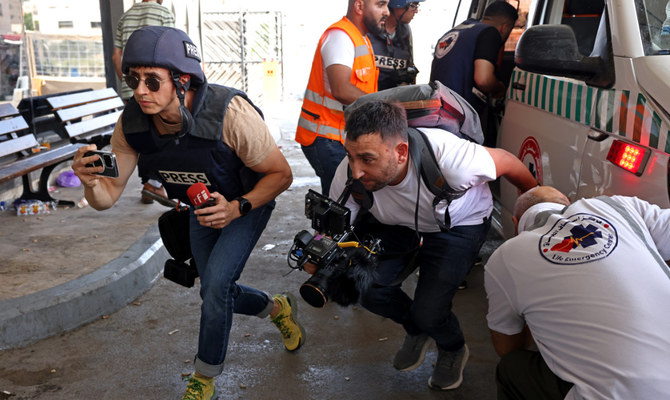
- Al-Araby TV workers were not injured but their equipment was destroyed
- Ameed Shehade, Rabih Al-Monayar were wearing ‘Press’ vests at time of attack
LONDON: American advocacy group the Committee to Protect Journalists says it is “extremely concerned” after hearing reports that two Al-Araby TV journalists were shot at by Israeli forces in the West Bank on Saturday.
Reporter Ameed Shehade and camera operator Rabih Al-Monayar came under fire while they were covering an Israeli raid on the village of Deir al-Ghusun in Tulkarm.
Neither of the men was injured in the attack but their equipment was destroyed.
The CPJ urged Israel to launch an investigation into whether the journalists were deliberately targeted.
“CPJ is alarmed by the Israeli soldiers’ shooting at two Al-Araby TV journalists, which hit their camera, while they were reporting in the West Bank,” the group’s Program Director Carlos Martinez de la Serna said.
Although he was “relieved” that the journalists had not been injured, he said he questioned whether the targeting was intentional as it was the second case of reporters being attacked while doing their jobs.
Al-Araby TV aired footage of the two men, who were wearing blue vests labeled “Press,” taking cover near their car.
Shehade said the shots were fired from a vehicle about 20 meters (22 yards) away and that they were clearly visible to the soldier.
Another journalist who was reporting on the raids confirmed that Shehade and Al-Monayar could be easily identified as members of the press.
According to The Guardian, Israeli forces killed five Palestinians in the overnight raid. Hamas confirmed that four of the men killed were from its al-Qassam armed wing.
Al-Monayar and Shehade suffered a similar attack in July last year while reporting on an Israeli operation against militants in the Jenin refugee camp in the West Bank. They again escaped personal injury but their video equipment was damaged.
Russia charges journalist with ‘justifying terrorism’
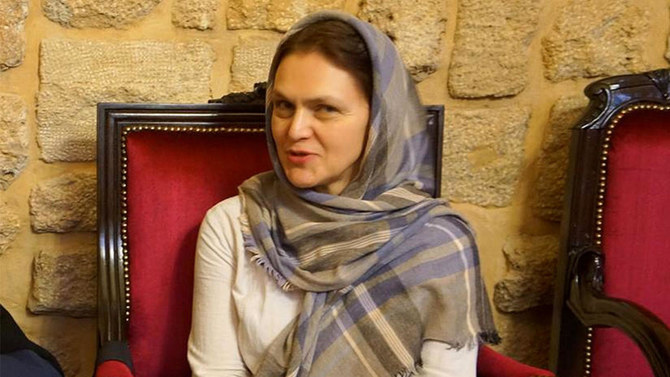
- Nadezhda Kevorkova was arrested for two Telegram posts regarding an Islamist raid and Afghanistan, her son reports
- The journalist specialized in coverage of the Middle East
MOSCOW: Russia has detained prominent journalist Nadezhda Kevorkova and charged her with “justifying terrorism” over posts on her Telegram account, her lawyer said Monday.
Kevorkova, 65, wrote for a number of outlets including Novaya Gazeta and Russia Today and specialized in coverage of the Middle East, including the Israeli-Palestinian conflict.
“Nadezhda Kevorkova has been detained and will be taken to a temporary detention center today. The matter of pre-trial restrictions will be decided tomorrow,” lawyer Kaloy Akhilgov said.
The charges relate to two posts on her Telegram from 2018 and 2021, one a re-post from another journalist about the 2005 Islamist raid on Nalchik and the other about Afghanistan, he said.
The raid on Nalchik, a city in Russia’s North Caucasus, saw armed Islamist militants target government and security buildings in an attack that left dozens of people dead.
Her ex-husband Maxim Shevchenko, who presents a talk show on state television, rejected the charges against her.
“Nadezhda Kevorkova never justified terrorism and never justified the attack on Nalchik ... but as a journalist, she certainly wrote about torture during the investigation,” he said.
Russia has waged an unprecedented crackdown on freedom of the press since launching its full-scale offensive in Ukraine, silencing and detaining journalists at odds with the Kremlin.
Media watchdogs raise alarm over Al Jazeera ban, call for it to be lifted
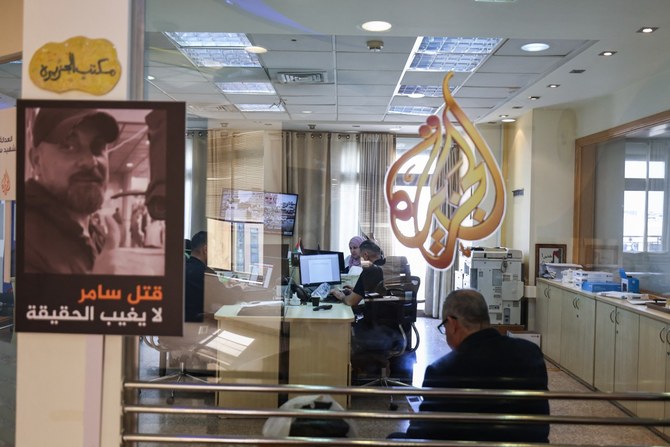
- Israel’s decision sets ‘dangerous precedent,’ Committee to Protect Journalists says
- News channel vows to continue Gaza coverage, will pursue ‘every legal step’ to fight block
LONDON: Media watchdogs have condemned Israel’s decision to block Al Jazeera, raising concerns about the erosion of media freedom in the country, especially amid the ongoing conflict in Gaza.
The US-based Committee to Protect Journalists said the government’s decision set a dangerous precedent for other international media outlets operating in Israel.
“CPJ condemns the closure of Al Jazeera’s office in Israel and the blocking of the channel’s websites,” program director Carlos Martinez de la Serna said in New York.
Israel should allow Al Jazeera and all international media outlets to operate freely, particularly during wartime, he said.
The Committee to Protect Journalists condemns the Israeli cabinet’s decision to shut down Al-Jazeera’s operations in Israel and warns that the vote could set a dangerous precedent for other international media outlets working in Israel. Our statement:https://t.co/X4wQEsYl1b
— Committee to Protect Journalists (@pressfreedom) May 5, 2024
Israel’s executive authority voted on Sunday to pass a law allowing the temporary shutdown of a foreign channel’s broadcasts if the content was deemed to be a threat to security during the ongoing war.
Soon after Prime Minister Benjamin Netanyahu announced the decision, reports emerged of raids on the offices of the Qatar-backed broadcaster.
The Foreign Press Association released a statement condemning the decision as a “dark day for the media” and accused Israel of joining “a dubious club of authoritarian governments” by banning the broadcasts.
The UN’s Human Rights office also urged the Israeli government to reverse the ban
“A free & independent media is essential to ensuring transparency & accountability. Now, even more so given tight restrictions on reporting from Gaza,” it said on X.
We regret cabinet decision to close Al Jazeera in Israel. A free & independent media is essential to ensuring transparency & accountability. Now, even more so given tight restrictions on reporting from Gaza. Freedom of expression is a key human right. We urge govt to overturn ban
— UN Human Rights (@UNHumanRights) May 5, 2024
There has also been criticism of the decision from within the country, with the Association for Civil Rights in Israel filing a request to the Supreme Court to overturn the ban.
The news came amid a yearslong campaign waged against Al Jazeera by the Israeli government, which accuses it of anti-Israeli bias and “being a mouthpiece for Hamas.”
The broadcaster rejected the claims and said it would “pursue every legal step” to fight the decision.
Al Jazeera also vowed to continue its coverage from Gaza, as it remains one of the few networks with a strong presence on the ground, as foreign journalists are banned from entering the Strip without Israeli army supervision.
The network accused Israel of deliberately targeting its staff in an attempt to silence them.
“Israel’s suppression of free press to cover up its crimes by killing and arresting journalists has not deterred us from performing our duty,” it said in its response to Sunday’s ban.
Despite the ruling, the channel remains accessible through Facebook in Israel.




